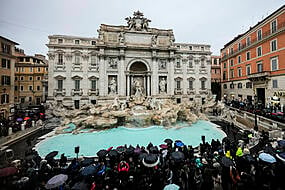Illinois’ election board on Tuesday kept former US president Donald Trump on the state’s primary ballot, a week before the US Supreme Court hears arguments on whether the Republican’s role in the January 6th, 2021, attack on the US Capitol disqualifies him from the presidency.
The board’s ruling comes after its hearing officer, a retired judge and Republican, found that a “preponderance of the evidence” shows Mr Trump is ineligible to run for president because he violated a constitutional ban on those who “engaged in insurrection” from holding office.
But the hearing officer recommended the board, comprising four Democrats and four Republicans, let the courts make the ultimate decision.
That will likely be the case now, with the Supreme Court scheduled next week to hear arguments in Mr Trump’s appeal against a Colorado ruling declaring him ineligible for the presidency in that state.

“This Republican believes there was an insurrection on Janusry 6th,” said board member Catherine McCrory before her vote, adding that she did not believe the agency had the legal authority to enforce that conclusion.
Mr Trump’s lawyer urged the board not to get involved, contending the former president never engaged in insurrection but that was not something it could determine.
“We would recommend and urge the board to not wade into this,” lawyer Adam Merrill said.
A lawyer for the voters who objected to Mr Trump’s presence on the ballot said they would appeal to state court.
“What’s happened here is an avoidance of a hot potato issue,” lawyer Matthew Piers said after the hearing. “I get the desire to do it, but the law doesn’t allow you to duck.”
The nation’s highest court has never ruled on a case involving Section 3 of the 14th Amendment, which was adopted in 1868 to prevent former confederates from returning to office after the Civil War but has rarely been used since then.
Some legal scholars say the post-Civil War clause applies to Mr Trump for his role in trying to overturn the 2020 presidential election and encouraging his backers to storm the US Capitol after he lost to Democrat Joe Biden.
Dozens of cases have been filed around the country seeking to bar Mr Trump from the presidency under Section 3. The Colorado case is the only one that succeeded in court.
Maine’s Democratic Secretary of State also ruled that Mr Trump violated the 14th Amendment and is no longer eligible for the White House, but her ruling is on hold until the Supreme Court issues a decision.
Mr Trump’s critics argue he is disqualified by the plain language of Section 3, which forbids those who swore an oath to “support” the constitution, then “engaged in insurrection” against it from holding office.
They contend the former president is ineligible just as if he did not meet the constitutional threshold of being at least 35 years old.
But Mr Trump’s lawyers have argued that the provision is vague and unclear and that January 6 does not meet the legal definition of an insurrection.
Even if it did, they argue, Mr Trump was simply exercising his First Amendment and is not liable for what occurred and that the bar on office should not apply to presidents.
Section 3 was heavily used immediately after the Civil War, but after Congress granted an amnesty to most former Confederates in 1872, it fell into disuse.

Legal scholars can only find one example of it being deployed in the 20th century — against a socialist who was not seated in congress because he objected to US involvement in World War One.
The Illinois board members concluded that, under state law, all they can do is assess whether the basic paperwork candidates fill out is true. The only way to remove Mr Trump would be by concluding he made a false statement when he swore under oath in that paperwork that he was eligible for the office he sought.
Board member Jack Vrett, a Republican, warned that would create a dangerous precedent, given the dozens of election boards in the state that follow the main one’s lead.
“If we allowed them to say ‘don’t just look at the papers, look at the underlying allegations’ that would open a floodgate,” Mr Vrett said.
“Every possible school board candidate would seek to challenge the qualification” of their rival, he added, “based on some alleged criminal conduct.”
Later on Tuesday, US president Joe Biden arrived in Florida and labelled his predecessor and potential opponent in this year’s campaign a “loser” while raising money for his re-election.
The first fundraiser of the day was held at the Pelican Club in Jupiter, a wealthy enclave less than an hour from Mr Trump’s Mar-a-Lago resort.
“You’re the reason Donald Trump’s the defeated president,” Mr Biden told donors. “And you’re the reason we’re going to make him a loser again.”







